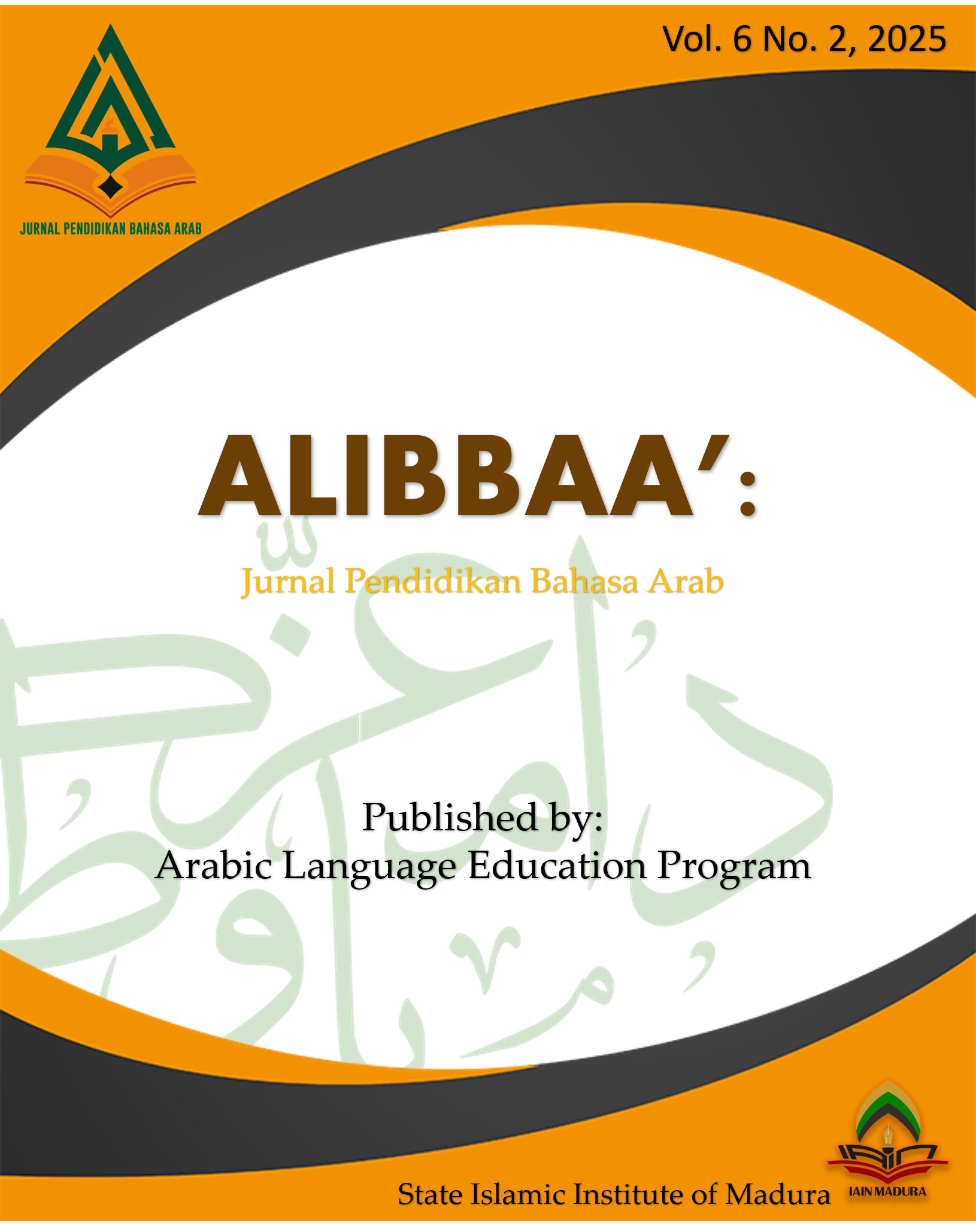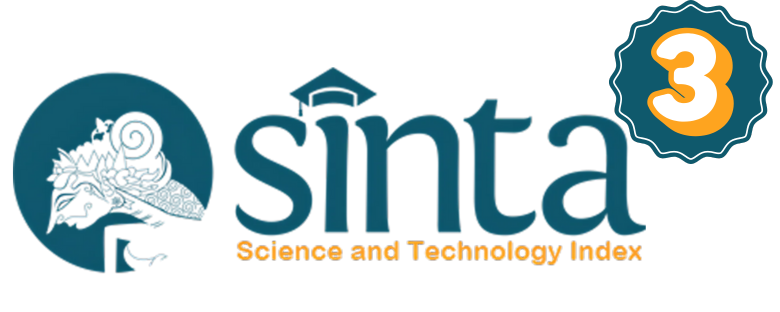Pedagogical Reform in Arabic Grammar: Innovating Qawāʿid Instruction through the Card Sort Method
 Abstract views: 342
,
Abstract views: 342
,
 pdf downloads: 506
pdf downloads: 506
Abstract
This study investigates the effectiveness of an active learning model using card sort media to improve students’ understanding of Arabic grammar (qawāʿid) at MTs Darut Taqwa 02. Adopting a quasi-experimental design with a quantitative approach, the study involved 40 ninth-grade students. Data were collected through pretest and posttest instruments. Results showed a notable increase in the average score from 52.75 to 79.25. Observational data also revealed high student engagement across cognitive, affective, and behavioral domains. These findings suggest that the card sort method offers a practical and engaging alternative for grammar instruction, especially in making abstract concepts more concrete and participatory. The study concludes that this approach can foster more meaningful learning and student motivation in Arabic language education.
Downloads
References
Boukthir, Khalil, Abdulrahman M. Qahtani, Omar Almutiry, Habib Dhahri, and Adel M. Alimi. “Reduced Annotation Based on Deep Active Learning for Arabic Text Detection in Natural Scene Images.” Pattern Recognition Letters 157 (May 2022): 42–48. https://doi.org/10.1016/j.patrec.2022.03.016.
Brent, Rebecca, Marisa Orr, Catherine E. Brawner, and Catherine Mobley. “Who Tells Your Story? A Card-Sort Activity for Eliciting Authentic Narratives.” International Journal of Qualitative Methods 20 (January 23, 2021). https://doi.org/10.1177/16094069211053104.
Broek, Simon, Maria Anna Catharina Theresia Kuijpers, Judith Hilde Semeijn, and Josje van der Linden. “Exploring Card-Sorting Potential to Uncover the Interplay between Adult Learners’ Motivations and Barriers to (Start to) Learn.” International Journal of Lifelong Education 44, no. 3 (May 4, 2025): 330–46. https://doi.org/10.1080/02601370.2025.2462163.
Creswell, J. W. Educational Research: Planning, Conducting, and Evaluating Quantitative and Qualitative Research (4th Ed.). 2nd ed. Pearson Education, 2012.
Dewi, Intan, Ahmad Nurcholis, Izzatul Laila, Juan Acevedo, and Moumen El-Sayed. “Curiosity-Driven Learning in Arabic: A Case Study on the ‘Inquiring Minds Want to Know’ Approach.” Alibbaa’: Jurnal Pendidikan Bahasa Arab 6, no. 1 (January 22, 2025): 42–64. https://doi.org/10.19105/ajpba.v6i1.17881.
Divekar*, Rahul R., Jaimie Drozdal*, Samuel Chabot*, Yalun Zhou, Hui Su, Yue Chen, Houming Zhu, James A. Hendler, and Jonas Braasch. “Foreign Language Acquisition via Artificial Intelligence and Extended Reality: Design and Evaluation.” Computer Assisted Language Learning 35, no. 9 (December 8, 2022): 2332–60. https://doi.org/10.1080/09588221.2021.1879162.
Eltahir, Mohd. Elmagzoub, Najeh Rajeh Alsalhi, Sami Al-Qatawneh, Hatem Ahmad AlQudah, and Mazan Jaradat. “The Impact of Game-Based Learning (GBL) on Students’ Motivation, Engagement and Academic Performance on an Arabic Language Grammar Course in Higher Education.” Education and Information Technologies 26, no. 3 (May 6, 2021): 3251–78. https://doi.org/10.1007/s10639-020-10396-w.
———. “The Impact of Game-Based Learning (GBL) on Students’ Motivation, Engagement and Academic Performance on an Arabic Language Grammar Course in Higher Education.” Education and Information Technologies 26, no. 3 (May 6, 2021): 3251–78. https://doi.org/10.1007/s10639-020-10396-w.
Ferguson-Patrick, Kate. “Cooperative Learning in Swedish Classrooms: Engagement and Relationships as a Focus for Culturally Diverse Students.” Education Sciences 10, no. 11 (October 31, 2020): 312. https://doi.org/10.3390/educsci10110312.
Fu’adah, Shofwatul. “Tathbîq Tiknûlûjiyâ (Istirâtîjiyah al-Kharîthah al-Dzihniyah) Li Hilli Musykilah Ta’lîm Mufradât al-Lughah al-’Arabiyah Lada Thullâb al-Fashl al-Sâbi’ Fî al-Madrasah al-Tsânawiyah ‘Nurul Jadid Banyuputih - Situbondo.’” Alibbaa’: Jurnal Pendidikan Bahasa Arab 1, no. 2 (August 25, 2020): 197–209. https://doi.org/10.19105/ajpba.v1i2.3572.
G. Dada, Emmanuel, Abdulkadir H. Alkali, and David O. Oyewola. “An Investigation into the Effectiveness of Asynchronous and Synchronous E-Learning Mode on Students’ Academic Performance in National Open University (NOUN), Maiduguri Centre.” International Journal of Modern Education and Computer Science 11, no. 5 (May 8, 2019): 54–64. https://doi.org/10.5815/ijmecs.2019.05.06.
Ghannam, Jumana. “Enhancing Independent Learning Competence and Grammar Language Learning Strategies.” In Professional Competencies in Language Learning and Teaching, 31–40. Research-publishing.net, 2019. https://doi.org/10.14705/rpnet.2019.34.912.
Hady, Rosli, and Ulyan Nasri. “Innovative Learning: Utilizing Card Sort Media to Amplify Arabic Vocabulary Understanding in NW Lenek Junior High School.” Jurnal Ilmiah Profesi Pendidikan 8, no. 3 (August 30, 2023): 1982–87. https://doi.org/10.29303/jipp.v8i3.2101.
———. “Innovative Learning: Utilizing Card Sort Media to Amplify Arabic Vocabulary Understanding in NW Lenek Junior High School.” Jurnal Ilmiah Profesi Pendidikan 8, no. 3 (August 30, 2023): 1982–87. https://doi.org/10.29303/jipp.v8i3.2101.
Hamzah, Hainora, Mohd Isa Hamzah, and Hafizhah Zulkifli. “Systematic Literature Review on the Elements of Metacognition-Based Higher Order Thinking Skills (HOTS) Teaching and Learning Modules.” Sustainability 14, no. 2 (January 12, 2022): 813. https://doi.org/10.3390/su14020813.
Jack R. Fraenkel, Norman E. Wallen, and Helen H. Hyun. How to Design and Evaluate Research in Education. New York: McGraw-Hill Higher Education, 2012.
Maimunah, Iffat, Sutaman Sutaman, R. Taufiqurrochman, Husnatul Hamidiyyah Siregar, and Moulay Mhamed Ismaili Alaoui. “SYNCHRONOUS ARABIC LEARNING BASED ON SOCIOCULTURAL THEORY: NEW TRENDS IN ARABIC LEARNING AT UNIVERSITY.” Arabi : Journal of Arabic Studies 7, no. 2 (December 21, 2022): 162–72. https://doi.org/10.24865/ajas.v7i2.480.
Muchsinul Khuluq. PEMBELAJARAN KETERAMPILAN BERBAHASA ARAB. Pamekasan: Duta Media Publishing, 2019.
Khuluq, Muchsinul, Moh. Ainin, Abdul Wahab Rosyidi, and Nurul Imamah. “The Development of Reading Skill Teaching Materials Based on Prezi Artificial Intelligence.” Arabiyatuna: Jurnal Bahasa Arab 9, no. 1 (June 31, 2025): 327–46. https://doi.org/10.29240/jba.v9i1.10886.
Muhlis, Wachida, Muassomah Muassomah, Ibnu Hajar, Hasmiati Hasmiati, Rusdiana Rusdiana, Andi Muammar Kareba, and Nurfadillah Nurfadillah. “Enhancing Nahwu Mastery: Implementation of the Card Sort Method in Madrasah Aliyah.” Alsinatuna 9, no. 2 (August 25, 2024): 207–21. https://doi.org/10.28918/alsinatuna.v9i2.2268.
Rasmuin, Rasmuin. “Implementation of Sort Card Method to Improve Motivation and Learning Outcomes of MAN Batu Students.” FITRAH: Jurnal Kajian Ilmu-Ilmu Keislaman 6, no. 2 (December 31, 2020): 161–72. https://doi.org/10.24952/fitrah.v6i2.2637.
Simon-Cereijido, Gabriela, Lisa M. Bedore, Elizabeth D. Peña, and Aquiles Iglesias. “Insights Into Category Sorting Flexibility in Bilingual Children: Results of a Cognitive Lab Study.” American Journal of Speech-Language Pathology 29, no. 3 (August 4, 2020): 1152–61. https://doi.org/10.1044/2019_AJSLP-19-00008.
Zhang, Qi, and Zhonggen Yu. “Meta-Analysis on Investigating and Comparing the Effects on Learning Achievement and Motivation for Gamification and Game-Based Learning.” Education Research International 2022 (August 1, 2022): 1–19. https://doi.org/10.1155/2022/1519880.
Authors who publish with this journal agree to the following terms:
a. Authors retain copyright and grant the journal right of first publication with the work simultaneously licensed under a Creative Commons Attribution License that allows others to share the work with an acknowledgement of the work's authorship and initial publication in this journal.
b. Authors are able to enter into separate, additional contractual arrangements for the non-exclusive distribution of the journal's published version of the work (e.g., post it to an institutional repository or publish it in a book), with an acknowledgement of its initial publication in this journal.
c. Authors are permitted and encouraged to post their work online (e.g., in institutional repositories or on their website) prior to and during the submission process, as it can lead to productive exchanges, as well as earlier and greater citation of published work (See The Effect of Open Access).
Alibbaa': Jurnal Pendidikan Bahasa Arab have CC-BY-SA or an equivalent license as the optimal license for the publication, distribution, use, and reuse of scholarly work.
In developing strategy and setting priorities, Alibbaa': Jurnal Pendidikan Bahasa Arab recognize that free access is better than priced access, libre access is better than free access, and libre under CC-BY-SA or the equivalent is better than libre under more restrictive open licenses. We should achieve what we can when we can. We should not delay achieving free in order to achieve libre, and we should not stop with free when we can achieve libre.

Alibbaa': Jurnal Pendidikan Bahasa Arab is licensed under a Creative Commons Attribution 4.0 International License
You are free to:
- Share — copy and redistribute the material in any medium or format
- Adapt — remix, transform, and build upon the material for any purpose, even commercially.
- The licensor cannot revoke these freedoms as long as you follow the license terms.











